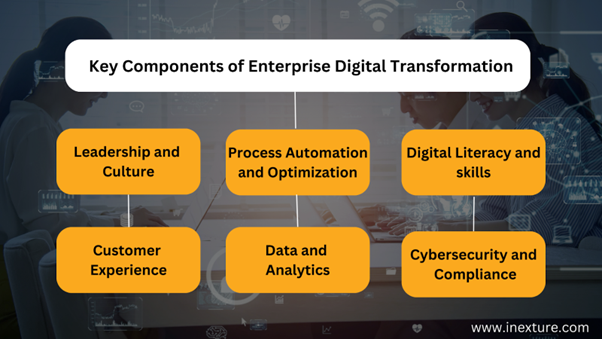Crypto Wallet App Development: Features,...
April 14, 2025

Did you know, businesses are facing an unprecedented need to adapt and innovate? This necessity has given rise to a concept at the forefront of modern business strategy: Enterprise Digital Transformation. This transformative process is more than a mere technological upgrade; it is a revolution at the core of business operations, culture, and customer engagement.
In this blog, let’s discuss what Enterprise Digital Transformation truly means, exploring how it’s reshaping how businesses operate and why it is considered the bedrock of future business growth.
Enterprise Digital Transformation is an extensive procedure that involves imagining and reinventing business models, processes, and approaches within an organization using digital technologies.
It is a long-term strategic journey, not a one-time occasion, to significantly change how organizations’ capability and deal worth to customers. This change goes past traditional roles and industry borders by adopting technologies like cloud computing, big data analytics, artificial intelligence, and the Internet of Things (IoT).
It is something other than technology adoption; it is likewise a culture change in which associations assume a digital-first mindset, cultivating creativity, agility, and a customer-centric approach.
A definitive objective of this change is to further develop productivity, further develop customer encounters, drive innovation, and raise efficiency.
Competitive Advantage: Companies that use digital technologies might foster them rapidly, respond to changes more quickly, and offer particular benefit recommendations that put them aside from competitors.
Improved Customer Experience: Digital tools and technology such as AI-driven analytics and individualized promoting allow businesses to more readily comprehend and address the requests of their customers. This outcomes in expanded client satisfaction and changelessness, the two of which are basic for corporate development.
Operational Efficiency: Companies can improve operations, cut costs, and eliminate inefficiencies by automating processes and utilizing data analytics. This results in faster and more effective service delivery as well as improved resource management.
Workforce Empowerment: Digital tools and technologies help employees to perform more productively and cooperatively. This improves not only productivity but also job happiness and attracts top talent.
Risk Management and Compliance: As data security and privacy become more important, digital transformation assists firms in improving their security architecture and ensuring compliance with relevant laws and regulations.
Global Reach: Digital platforms and e-commerce solutions allow businesses to reach a global audience, expanding their market and enabling them to operate across borders more easily.
Recommended Read: How Enterprise Search could be Master Key to Success for your Business
Enterprise Digital Transformation is a multifaceted process that encompasses various components, each playing a vital role in its successful implementation. Let’s discuss this in detail.
Did you know enterprises are increasingly recognizing the crucial role of Enterprise Search as a master key to success? This powerful tool unlocks the capacity of vast data reserves, enabling businesses to control information effectively for strategic decision-making and operational efficiency.

Leadership and Culture: Transformation begins at the top, with leadership committed to fostering a culture of change, innovation, and digital-first thinking. This involves encouraging a mindset shift across the organization, promoting agility, risk-taking, and a customer-centric approach.
Data and Analytics: Data is a crucial asset in the digital era. Effective use of data analytics enables businesses to gain insights into customer behavior, operational efficiency, and market trends, guiding informed decision-making and strategy development.
Digital Literacy and Skills: Equipping employees with the necessary digital skills and literacy is essential. This involves training and development programs to ensure the workforce can effectively use new technologies and adapt to digital workflows.
Customer Experience: Refocusing the business strategy to prioritize customer experience is vital. This includes leveraging digital channels for customer engagement, personalizing customer interactions, and using customer feedback to drive improvements.
Process Automation and Optimization: Automating routine tasks and optimizing business processes is key to improving efficiency and productivity. This can be achieved through digital tools that streamline workflows and reduce manual labor.
Cybersecurity and Compliance: As businesses become more digitally oriented, ensuring data security and compliance with regulations is critical. This involves implementing robust cybersecurity measures and continuously monitoring and adapting to new compliance requirements.
The evolution of digital transformation has been a journey from basic digitization to profound business model changes. Initially, it centered on converting analog processes to digital formats, like moving from paper records to digital systems.
The arrival of the internet and mobile technology later revolutionized how businesses interacted with customers and employees, giving rise to e-commerce, digital marketing, and remote work.
Advancements in cloud computing and the rise of big data, powered by IoT and social media, pushed businesses towards data-driven strategies, with AI and ML becoming crucial for personalized experiences and analytics.
Today, digital transformation transcends mere technology adoption, focusing on agile, innovative business models and operations that are customer-centric. It includes leveraging technologies like blockchain and augmented reality for new business practices.
Looking forward, the role of digital transformation is set to expand, driven by emerging technologies like 5G and advanced AI, signifying a continuous push towards a more interconnected, efficient digital ecosystem.
Digital transformation profoundly alters business models and operations. By integrating digital technologies, companies are innovating their models to generate new revenue streams and offer unique value propositions.
This leads to a customer-centric approach with personalized services as key differentiators. Operationally, automation increases efficiency and accuracy and reduces costs. Technologies like AI and IoT enable predictive maintenance and agile decision-making. Data analytics becomes crucial, allowing for strategic, data-driven planning.
This transformation not only streamlines current operations but also enables innovation, market exploration, and quick adaptation to customer needs, ultimately guiding businesses toward a more agile, data-informed, and customer-focused future.
Drivers of Digital Transformation and technological advancements are reshaping industries and influencing business strategies.
Today’s competitive business landscape is rapidly evolving due to technological advancements, with digital transformation lowering barriers across various sectors. This has enabled startups and innovative companies to challenge established players beyond just tech industries, affecting finance, healthcare, retail, and manufacturing.
Traditional businesses now compete with digital-first entities that offer personalized services and leverage technologies like data analytics and AI for a competitive edge. With the fast pace of change and transient market leadership, businesses must continuously innovate and adapt, focusing on agility, customer-centricity, and digital technology utilization to succeed and survive in this dynamic environment.
Implementing digital transformation presents several challenges and considerations that businesses must navigate. One of the primary hurdles is the resistance to change, often stemming from organizational culture and employee apprehension.
Ensuring alignment across different departments and integrating new technologies with existing systems can also be complex and resource-intensive. Another critical challenge is maintaining data security and privacy, especially with the increasing reliance on digital platforms and cloud-based solutions.
Businesses must also consider the significant investment required, not just in technology, but in training employees and restructuring business processes. Additionally, there’s the need for a clear strategic vision and strong leadership to steer the transformation effectively.
Keeping up with the rapidly evolving technological landscape and choosing the right technologies that align with business goals is another important consideration. Finally, measuring the impact and ROI of digital initiatives is crucial for ongoing adaptation and success.
The future of Enterprise Digital Transformation is poised to be shaped by several emerging trends, with a significant focus on Enterprise Mobility Solutions and the role of an Enterprise Portal. Enterprise Mobility Solutions are revolutionizing business operations by enabling greater flexibility and remote access to company resources, fostering a more agile and responsive work environment. An Enterprise Portal, serving as a centralized platform for information and resource management, will further streamline this transformation, enhancing communication and collaboration across the enterprise.
Furthermore, the integration of AI and machine learning will proceed to automate and advance business processes, offering more precise prescient analytics and customized customer experiences. The Internet of Things (IoT) is set to assume a vital part, connecting a myriad of devices and sensors, which prompts more operations and enhanced data collection.
The adoption of blockchain technology is expected to rise, giving secure and transparent techniques to transactions and data management.
Moreover, with the increasing reliance on digital platforms, the emphasis on cybersecurity will become more critical, ensuring the protection of digital assets in an online business world.
These trends collectively indicate a shift towards a more interconnected, intelligent, and secure digital business landscape, where Enterprise Mobility Solutions and Enterprise Portals play crucial roles in driving forward the digital transformation agenda.
Growing Importance of Enterprise Mobile Application Development: The development of enterprise mobile applications, a crucial aspect of Mobile App development, has become a key insight in digital transformation strategies.
Integration of Advanced Technologies: The integration of technologies like AI, IoT, and cloud computing is crucial for modern businesses. These technologies drive innovation, improve customer experiences, and offer significant competitive advantages.
Emphasis on Cybersecurity: As enterprises undergo digital transformation, the emphasis on robust cybersecurity measures is paramount. Protecting sensitive data and digital assets is critical in an era where cyber threats are increasingly sophisticated.
Shift Towards a Customer-Centric Approach: Digital transformation is increasingly focusing on creating personalized customer experiences. By leveraging data analytics and digital platforms, businesses can better understand and meet the evolving needs of their customers.
Recommended Read: Enterprise Mobile Application Development: How to Build A Robust App